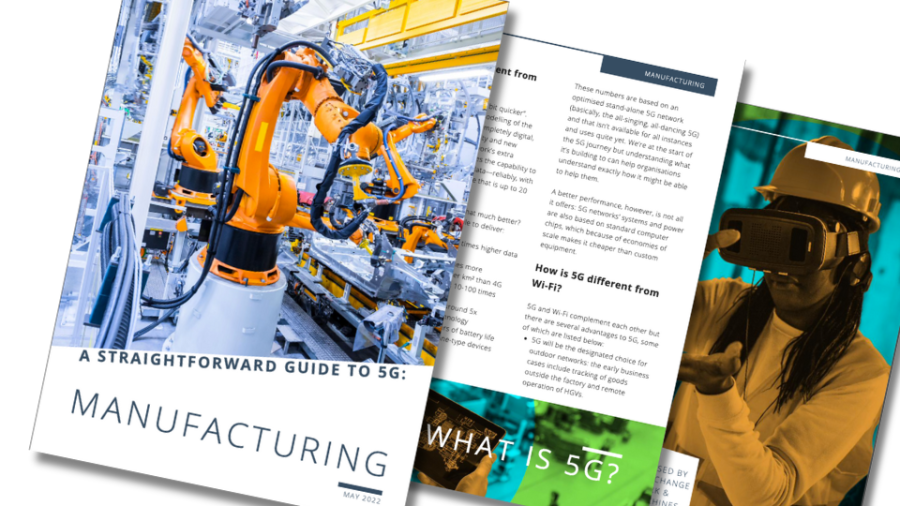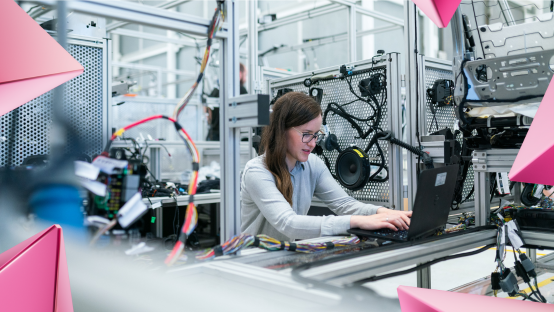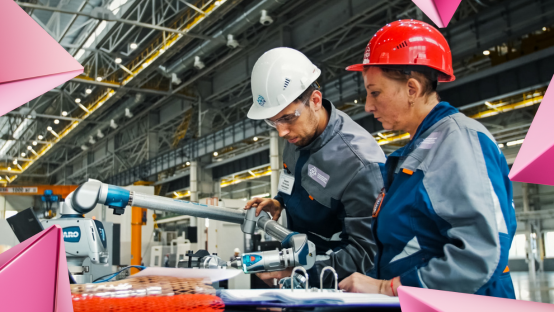
From the Industrial Revolution to Industry 4.0, manufacturing has always been a cornerstone of the UK economy. Continuous innovation has been the driving force behind this, but today – more than ever – manufacturers are under constant pressure from shrinking margins and in some instances, rising demands to boost factory efficiency, while enhancing safety and security.
Spurred by shorter product lifecycles and the long lasting impact of Covid-19, these longstanding challenges are made even more complex by the need for agility and emerging skills gaps. Not forgetting the need for every manufacturer to operate more sustainably and address future net zero requirements for the good of the planet, and their business. Together, this vast and varying range of factors makes the imperative for change far greater.
Read more to discover some of the ways you can be better connected.
Benefits of 5G for Manufacturing
The higher bandwidth and low latency of 5G creates the opportunity to manage and analyse large amounts of data in real-time. 5G can be used to connect goods, assets, the manufacturing line and even the factory as a whole, to AI tools in the cloud. This allows for less downtime, fewer ‘lost’ assets and greater productivity.
Be it tracking and monitoring assets and supplies, moving to a predictive maintenance model, linking bespoke customer requests to a dynamic supply chain or having the flexibility to easily reconfigure production lines, 5G enables a level of insight and control not yet seen. Real-time, high-quality images, video and data can also be shared with AI and ML systems optimising the output of your factory, improving efficiency, quality control and reducing waste.
The speed and reliability of 5G allows for the creation of live digital twins, to digitally replicate the manufacturing environment. This enables more thorough, accurate and rapid testing in a virtual dimension before production hits the factory floor, minimising the need for downtime, disruption or costly mistakes. Processes can also be analysed in greater detail and maximised for both the efficiency and sustainability of the factory floor. The improved speed, volume, and reliability of 5G allows for comprehensive digital twins, to run ever more complex scenarios. All of which means: accelerated transformation.
Network security and a stable connection is of the upmost importance for manufacturers – a dropped connection might jeopardise worker safety, hold up production, or affect the quality of the final product. 5G has security and resilience built in as part of the standard. AI and automated security tools can also be layered over the top for greatly enhanced security. It means manufacturers can migrate to wireless connectivity with confidence, while unlocking added agility and flexibility.
Through creating a private 5G network or partnering with a Mobile Network Operator to utilise a 5G ‘network slice’, businesses can create a ubiquitous, flexible network across multiple sites, granting seamless access for third-parties to carry out remote maintenance, training or security. This is simpler to manage than multiple wireless networks and makes data sharing and collaboration across multiple sites and organisations much easier. This fosters greater innovation and collaboration between teams, partners and suppliers, levelling-up the UK’s manufacturing sector across the board.
Toyota Material Handling, the US-based forklift truck manufacturer, is running its business-critical operations at its 200,000 square-foot (19,000 square-metre) factory in Columbus, Indiana, “exclusively” over an Ericsson-made private 5G network in CBRS spectrum, it has said. The private 5G installation was completed last November by US system integrator STEP. It has replaced its entire Wi-Fi network with private 5G, a statement said.
Toyota Material Handling, a division of Japanese machine maker Toyota Industries (a subsidiary of vehicle maker Toyota), produces and distributes forklifts, tractors, and various aerial work platforms for the US industrial market. The firm has claimed “increased productivity, faster deliveries, and boosted morale” since the private 5G network went live, across its indoor and outdoor sites. The local 5G setup was designed by Ericsson and STEP together, said the statement.
Training and remote support can be run in real-time using mixed reality and dynamic data visualisation, addressing the sector’s burgeoning skills gap. An estimated 60% of UK engineers are over the age of 50, meaning the sector is likely to face a dramatic drop off in technical knowledge over the next 10-15 years. 5G enables technologies like AR/VR on the shop floor, so you can decentralise expertise and ensure all workers are armed with the insights and support they need, when they need it, across multiple sites, in real-time. This also means less travel and costs, speeding up response times and supporting sustainability initiatives.
5G will enable new levels of automation for manufacturing, from logistics and warehousing to the production line. Owing to its high bandwidth and low latency, 5G allows robots to undertake more complex tasks and facilitates closer collaborative working with humans. Not only will this drive efficiency, but the ability for remote control means they can be deployed in hazardous environments and stopped or redirected in an emergency, all of which helps to boost worker safety.
It’s true that not all of these benefits are instantly accessible, but as 5G and other solutions mature and innovation continues we expect to see these open up to Manufacturing.
Explore the possibilities

Design and Planning
Advanced connectivity solutions, including 5G, could facilitate more efficient and effective ways of working as planning and designing processes and plants has become more complex

Production
A survey by The Manufacturing Institute found that manufacturers expect 5G to initiate an estimated 42% increase in machine output, in addition to 41% for workers

Operations
5G connected factories offer unparalleled insights, controls and the ability to create digital twins to optimise the factory from the production line to warehousing, all in real-time

Maintenance and Support
5G supports condition-based maintenance, marking a shift towards repairing products at the point of requirement instead of on a fixed interval basis

Supply Chain
5G networks will assist the supply chain via automation and enhanced track and trace capabilities: innovative technologies, powered by 5G’s high bandwidth and low latency, will ensure everything runs smoothly
The UKTIN Manufacturing Expert Working Group is a group of voluntary experts brought together to consider key opportunities to capitalise on the benefits of advanced connectivity across the manufacturing sector.
Our Supplier Directory introduces you to find a range of organisations who can help you design and deliver connectivity solutions, including those who specialise in working with manufacturers.
Read our in-depth guide to deploying 5G in a manufacturing environment.


